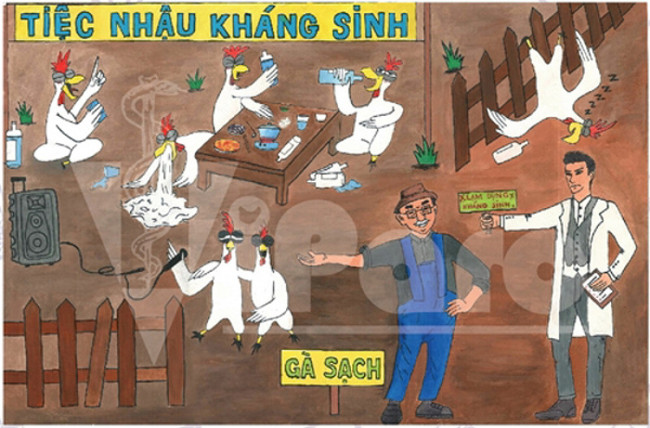Detecting strange bacteria on meat in Vietnam
Scientists from the ViParc project (Oxford University Clinical Research Unit, HCMC Tropical Diseases Hospital) recently found Salmonella resistant to colistin in pork bought from traditional markets.
On January 8, Ms. Vu Thi Quynh Giao, Oxford University Clinical Research Unit, said that currently, misuse and overuse of antibiotics are common in the Vietnamese livestock industry, one of the cause of. This phenomenon occurs when the bacteria resist the effect of the drug causing the treatment of bacterial infections in animals and people fail.
Scientists from the ViParc project (Oxford University Clinical Research Unit) recently found resistance to colistin in pork bought from traditional markets in HCMC (Salmonella type without typhoid).
This is the first time colistin resistant bacteria have been detected in meat in Vietnam. Colistin is an antibiotic used to treat severe infections, often used only for people as a last resort, when other drugs are not effective.

One of the students' entries is aimed at using clean poultry food.
On the same day, Ho Chi Minh City Hospital for Tropical Diseases said that it had just launched a photo contest with the topic "Quitting antibiotics for poultry" aimed at reducing the use of antibiotics in chicken and duck production.
The competition was organized by the University of Oxford Clinical Research Unit, the Center for Communication - Health Education and the Department of Education and Training of Dong Thap Province, which took place in Dong Thap province from the end of 2017 until now. There are 123 students from 2 high schools participating in many new, witty and lively communication methods on antibiotic abuse in Vietnam, through photos, drawings and short articles.
The program is a community activity of ViParc, a research project aimed at helping people in the Mekong Delta breed healthy chickens but use less antibiotics.
- The fast-growing cannibalism bacteria
- The most toxic and strange forms of bacteria on the planet
- International space station infected with strange bacteria
- Why eating red meat is bad for the heart?
- Super glue from meat-eating bacteria
- Stunned to find bacteria in the brain
- Bacteria that cause food poisoning prefer duck to beef
- Strange guy only eat raw meat
- Detecting oral bacteria can cause serious illness
- What do you know about 'vegetarian' meat?
- 'Hack' intestinal bacteria of cows can bring more meat and reduce pollution
- Detecting killer shrimp species
 Why do potatoes have eyes?
Why do potatoes have eyes? 'Tragedy' the world's largest carnivorous life: Death becomes ... public toilet
'Tragedy' the world's largest carnivorous life: Death becomes ... public toilet Tomatoes were once considered 'poisonous' for 200 years
Tomatoes were once considered 'poisonous' for 200 years Detecting microscopic parasites on human face
Detecting microscopic parasites on human face